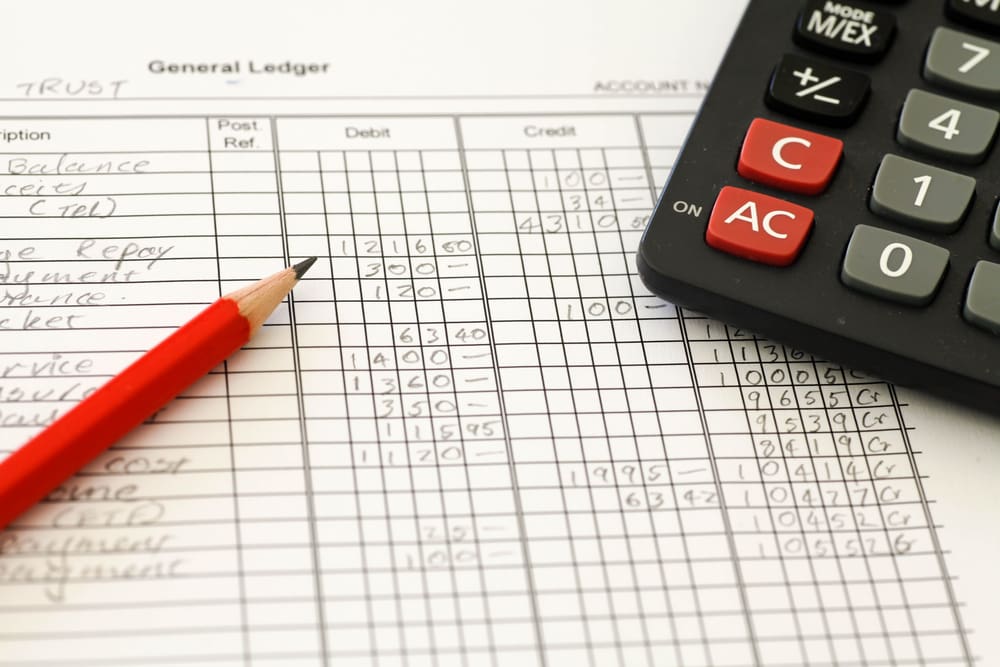Learn the basics of how each financial transaction affects a general ledger account, and how you can master creating financial statements.
What Is an Accounting Ledger?

An accounting ledger is a book that compiles all the information needed to prepare financial statements. It shows the various accounts from journal entries.
Accounting journals are the initial record of the transactions, the ledger summarizes and organizes the entries into debits and credits. Since the ledger acts as a second record-keeping book, it may also be referred to as the second book of entry.
The ledger contains a wide range of information including:
- Revenues
- Equity
- Assets
- Liabilities
- Expenses
There are three main types of accounting ledgers:
- Purchase ledger: Shows accounts payable.
- Sales ledger: Records accounts receivable.
- General ledger: Records the accounts receivable and payable (debits and credits). The general ledger (nominal ledger) shows a business’s financial transactions. It prepares everything needed for a company’s financial statements.
What Is a Ledger Account?
Ledger accounts record all the transactions that affect a specific account with the general ledger. Each transaction is identified within the ledger account, along with a transaction number, date, and description. This makes it easy to find and look at the reason for the transaction.
Businesses can create ledgers for any income statement and balance sheet accounts. Here are some accounts that might come from the general ledger:
- Revenue accounts: Service fees and sales.
- Asset accounts: Accounts receivables, cash accounts, and prepaid expenses.
- Equity accounts: Shareholder distributions, common stocks, and retained earnings.
- Liability accounts: Credit, accounts payable, and accrued expenses.
- Expense accounts: Rent, advertising, wages, and supplies.
How Do You Write a General Ledger?
Generally, companies use accounting software to keep track of accounting ledgers. But if you want to create a general ledger for your business, you should understand a little bit about double-entry bookkeeping.
The double-entry bookkeeping method is when one transaction affects no less than two general ledger accounts.
This means that every transaction is recorded in two columns, one in debit (on the left) and one in credit (on the right). These two columns need to balance when compiling financial reports.
Now, let’s look at the steps to creating your own ledger:
Set up the ledger accounts
Begin with the five account types above. Within each of those accounts, list which of the accounts you will need. For example, accrued expenses and credit accounts. Each of these will have a ledger.
Columns
For each ledger make three columns on the left for the date, journal entry number, and description.
On the right, make three columns for debits, credits, and running balance.
Record transactions
As transactions happen you can record them as a journal entry and then into the corresponding ledger, to keep everything up to date.
Create a trial balance
Using the debits and credits in each account, sum up the totals to create a trial balance report. This balance is then matched against the journal entries to create financial statements, including a balance sheet and income statement.
Why Create a Ledger if I Already Have a Journal?
The benefit of having both is to monitor accounts accurately. The journal has raw accounting entries to record financial transactions in order of date. A general ledger breaks things down into five different accounting items, allowing accountants to see where each financial transaction takes place and why. This is a big help when balancing accounts.
Wrap Up
Keeping track of a business’s financials is imperative to business success. But things can get complicated if there are multiple transactions taking place. That’s where accounting ledgers come in. They use the information from the journal to provide detailed information for each transaction.
Ensuring your business transactions balance can be tricky if you don’t understand the basics. That’s where hiring an accountant can genuinely help to keep your company’s journals and ledgers balancing.
Sources:
https://www.freshbooks.com/hub/accounting/what-is-a-ledger
https://www.investopedia.com/terms/g/generalledger.asp
https://gocardless.com/guides/posts/a-complete-guide-to-accounting-ledgers/
https://www.investopedia.com/terms/t/trial_balance.asp
https://www.youtube.com/watch?v=w2FmuagHkF4